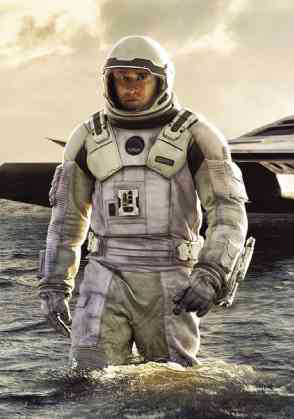No stranger to chaotic mindscapes and dreamscapes, filmmaker Christopher Nolan boldly traverses time and space with “Interstellar”—an ambitious, if occasionally contrived, adventure about astronauts who leave a dying Earth in search of a habitable replacement planet.
“Interstellar” stars Matthew McConaughey, fresh from his indelible “True Detective” gig, as Cooper, a father who abruptly leaves his family to pilot a ship with a small crew: Abigail (Anne Hathaway), Romilly (David Gyasi), Doyle (Wes Bentley) and a big, box-like robot named TARS.
Surprises
The mission, organized by Abigail’s scientist father (Michael Caine), brings the group to the farthest reaches of space, but the astronauts are still able to communicate with their loved ones back home.
However, the trip has unexpected variables, several surprises that tremendously affect the explorers.
Cowritten by Nolan and his brother, frequent collaborator Jonathan (“Prestige,” “The Dark Knight,” etc.), “Interstellar” clocks in at two hours and 49 minutes, a mind-bending space drama that tells, rather unevenly, a distinctly human story that raises existential questions.
It answers those questions, too, through the story of the everyman-explorer who discovers crucial truths about his place in the universe.
Human element
Thus, it feels like a couple of “Doctor Who” episodes compressed into one film—story-wise and in terms of emotion-tugging—but “Who” stories are considerably tighter especially with their signature time-travel story elements.
“Interstellar” has fantastical, showy scenarios, some of which bend existing rules of science to serve whatever’s required at the moment. Iffy or hokey aspects aside, the human element rightly stands out and keeps one transfixed—Cooper’s family drama is easy to identify with and keeps viewers accordingly invested.
“Interstellar” also manages to make full use of the talented cast—aside from the aforementioned actors, the film benefits from portrayals by Jessica Chastain, Casey Affleck and Topher Grace.
Familiar tics
There are some familiar Nolan tics, though. It gets a little numbing when Caine is heard repetitively as a voice reciting a poem. He’s a comforting presence, sure, but this technique got tiring in the “Batman” films, too.
And then there’s a mentor figure withholding important, life-changing information, like in other Nolan films.
While it’s not as clever and original as it hopes to be, “Interstellar” wins you over with sheer attention to characters’ relationships and dynamics; ultimately, the film’s relatable components overpower its near-magical trappings and questionable parts.
